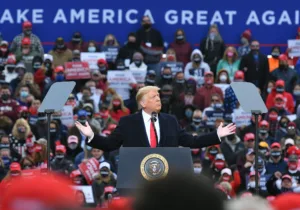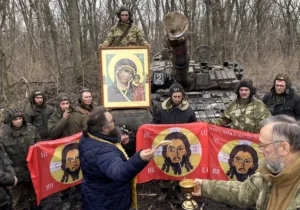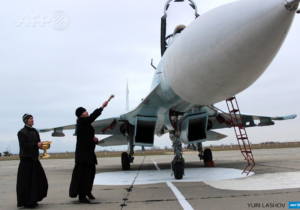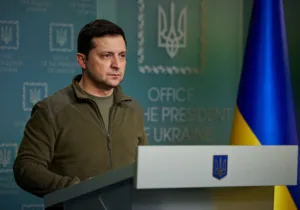President Zelensky’s recent surprise visit to Washington recalled a similarly dramatic visit from a war zone. Churchill’s 1941 trip to see FDR after Pearl Harbor was even more extraordinary. He crossed the Atlantic in a battleship in a 10-day voyage, flew from Hampton Roads in a U.S. warplane (like Zelensky from Poland), joined FDR on Christmas Eve to light the outdoor White House Christmas tree from the White House balcony and address the world together by radio, attended Foundry Methodist Church on Christmas morning with the Roosevelts, and addressed a joint session of Congress the day after Christmas. After days of military strategy meetings, on New Year’s Day Churchill and the Roosevelts honored a national day of prayer by worshipping at Christ Episcopal Church in Alexandria, Virginia, sitting in George and Martha Washington’s pew, then visiting Mount Vernon.
There were spiritual themes throughout the visit. One Christmas Eve, FDR told the world: “Our strongest weapon in this war is that conviction of the dignity and brotherhood of man which Christmas day signifies—more than any other day or any other symbol. Against enemies who preach the principles of hate and practice them, we set our faith in human love and in God’s care for us and all men everywhere.”
Speaking after FDR on the dark balcony with the lighted Christmas tree in the distance, Churchill urged a festive holiday for the children, before “we turn again to the stern task and the formidable years that lie before us, resolved that, by our sacrifice and daring, these same children shall not be robbed of their inheritance or denied their right to live in a free and decent world.” He concluded, “And so, in God’s mercy, a happy Christmas to you all.”
Before Congress two day slater, Churchill cited the common bond uniting the English-speaking peoples and of the long hard years of war ahead. Those bonds included, he said, a commitment to democracy, as expressed through the political careers of his father and himself, recalling: “I used to see him cheered at meetings and in the streets by crowds of workingmen way back in those aristocratic Victorian days when as Disraeli said ‘the world was for the few, and for the very few.’” And: “Therefore I have been in full harmony all my life with the tides which have flowed on both sides of the Atlantic against privilege and monopoly and I have steered confidently towards the Gettysburg ideal of government of the people, by the people, for the people.”
Churchill mystically and stirringly concluded: “He must indeed have a blind soul who cannot see that some great purpose and design is being worked out here below of which we have the honor to be the faithful servants. It is not given to us to peer into the mysteries of the future. Still, I avow my hope and faith, sure and inviolate, that in the days to come the British and American peoples will, for their own safety and for the good of all, walk together in majesty, in justice and in peace.”
In a not dissimilar speech, Zelensky told Congress: “The battle is not only for life, freedom and security of Ukrainians or any other nation which Russia attempts to conquer.” And: “This struggle will define in what world our children and grandchildren will live, and then their children and grandchildren. It will define whether it will be a democracy of Ukrainians and for Americans — for all.” And he predicted: “Next year will be a turning point, I know it, the point when Ukrainian courage and American resolve must guarantee the future of our common freedom, the freedom of people who stand for their values.”
Zelensky recalled FDR’s post-Pearl Harbor war declaration promising victory and the determination of American troops fighting during Christmas 1944 at the Battle of the Bulge. He concluded: “God protect our brave troops and citizens, may God forever bless the United States of America. Merry Christmas and a happy, victorious New Year. Slava Ukraini. [Glory to Ukraine.]”
Although not at Christmas, but in the same fighting spirit as Zelensky and Churchill, China’s magnetic First Lady Madame Chiang Kai-shek addressed congress in 1943, having also left the war front in her country on a long journey across oceans and continents. Having encountered many U.S. military personnel of many ethnicities and nationalities on her way, she shared her “impression of my trip is that America is not only the cauldron of democracy but the incubator of democratic principles.” Even with different “accents so thick, that if such a thing were possible, one could not cut them with a butter knife,” yet “they were, all Americans, all devoted to the same ideals, all working for the same cause, and united by the same high purpose. No suspicion or rivalry existed between them. This increased my belief and faith that devotion to common principles eliminates differences in race and that identity of ideals is the strongest possible solvent of racial dissimilarities.”
In contrast, Chiang noted, the Japanese aggressors believed themselves racially preferred “Nietzschean supermen — superior in intellect and physical prowess, a belief which the Gobineaus and the Houston Chamberlains and their apt pupils, the Nazi racists, had propounded about the Nordics.” She was citing two infamous theorists of racial superiority, Joseph Arthur de Gobineau, a 19th century Frenchman, and Houston Stewart Chamberlain, a British German who inspired Hitler. Chiang told Congress: “It now remains for you, the present representatives of the American people, to point the way to win the war, to help construct a world in which all peoples may henceforth live in harmony and peace.” And she concluded: “Man’s mettle is tested both in adversity and in success. Twice is this true of the soul of a nation.”
These speeches to Congress by Churchill, Chiang and Zelensky were all equally defiant, confident, grateful for American friendship and insistent on American leadership in shaping a better world where aggression by tyrants is defeated and deterred. “We defeated Russia in the battle for minds of the world,” Zelensky said. “We have no fear, nor should anyone in the world have it. Ukraine gained this victory, and it gives us courage, which inspires the entire world. Americans gained this victory and that’s why you have succeeded in uniting the global community to protect freedom and international law.”
We can hope that America will always seek to lead in protecting freedom and international law from despots and aggressors fueled by ideologies of superiority and control. May our Congress always welcome leaders who fight for liberty. And may Christmas Season and New Year’s always remind us of gratitude for our blessings and aspirations for a world more aligned with God’s principles of justice, humanity and peace.







 Live in the DC area? Sign-up for Providence's in-person events list!
Live in the DC area? Sign-up for Providence's in-person events list!